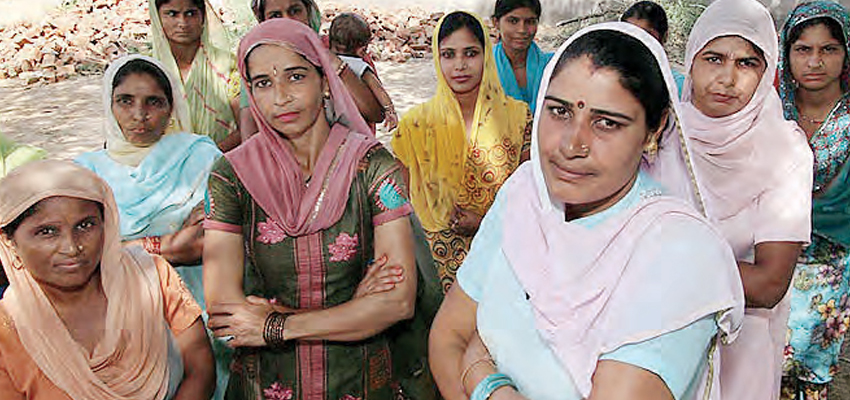A school dropout ‘Sarpanch’ who discards the ‘Ghoonghat’

“Never underestimate the power of a woman.”
-Nellie McClung
"The ghoonghat no longer works for me. It holds me back and stops me from fully participating in my family or the things that concern our village. But most importantly, it robs me of my identity as a person"
-Sushma Bhadu
Sushma Bhadu of Dhani Miyan Khan village, Fatehabad district, in Haryana, not only fought to swagger among her bête noire but also took a pop at the centuries-old cultural tradition that dictates she be covered with a ghoonghat in public places. In a state where Khap Panchayats have the final say on almost all issues and a district that is considered to be one of the most backward, the task required extraordinary courage. “With the backing of my mother-in-law and husband, I lifted my ghoonghat amid 2,000 people from 25 neighbouring villages on 22 June 2012,” Sushma says. This 30-year-old mother of three had been telling her husband for a long time that the piece of fabric had nothing to do with respect. “Izzat to dil se hoti hai, muh chupaane se nahi (respect comes from the heart, not by hiding faces),” she says. She managed to convince her 70-year-old mother-in-law too! “Meri bahu ne bahut achcha kaam karyo. Main iske saath hun (My daughter-in-law has done a great job. I stand by her),” says Ram Kumari, Sushma’s mother-in-law.
“Initially, I was a bit apprehensive of my wife’s step, as all women in the village follow the custom. But the day she discussed things with me openly, I decided to stand by her and trigger a social change. Now, when I see 98% of the women here without a veil, I spot a sense of equality in men’s eyes for their partners,” said Sushma’s 35-year-old husband Bhagwan Das. But the young sarpanch had evidently touched a raw nerve in the psyche of the women present on the occasion. “It was like a flood,” recalls Bhagwan Das. Scores of women, old and young, stood up and cast aside their ghoonghats, vowing never to let the customary piece of cloth “hold them back again”. At first, Das felt a great relief that his wife was no longer alone and could not be singled out for ridicule. “I now feel tremendous pride in what she seeks to do,” says the cotton farmer, who had never understood the logic of the straitjacketed traditions of his Bishnoi community.
"The ghoonghat no longer works for me. It holds me back and stops me from fully participating in my family or the things that concern our village. But most importantly, it robs me of my identity as a person "
-Sushma Bhadu
A week after the incident she publicly discarded the “infernal” veil at a conference of women panchayat members, girl students and anganwadi workers from 25 neighbouring villages. “The ghoonghat no longer works for me. It holds me back and stops me from fully participating in my family or the things that concern our village. But most importantly, it robs me of my identity as a person,” Bhadu declared, enunciating wisdom that belied her meagre education. The change is already palpable in the tiny hamlet. As you near Dhani Miyan Khan on the bumpy ride from Fatehabad, there is something different about the colourfully clad women riding home on bicycles or others urging bullocks pulling carts laden with bales of cotton.
“It is not easy,” she says, narrating how men from neighbouring settlements mock the women of Dhani Miyan Khan. “Ab to tumhe chhoot mil gayi hai, kuchh bhi kar sakti ho (Now you have all the freedom, you can do anything),” they call out derisively, often adding unprintable suggestions of what the “kuchh bhi” could be. “But we are not about to give up. Catcalls and jeers are a man-thing. If we give in, they will find something else,” she smiles again.
"We will constitute a vigilance committee of villagers to keep an eye on pregnant women and report to the authorities any case of female foeticide that comes to our notice"
 Sushma Bhadu (right) the Sarpanch of Dhani Miyan Khan village in Haryana
Sushma Bhadu (right) the Sarpanch of Dhani Miyan Khan village in HaryanaInside the village, a feminine touch is evident everywhere. The streets are all paved, neatly laid over with interlocking concrete blocks, the streetlights work, and every home has a power and water connection. The drainage is open, but free of any blockage or the mosquito-infested cesspools one finds in adjacent settlements. Dhani Miyan Khan, which shines like a wellkept home, was awarded the 2012 Nirmal Gram Puraskar for its sanitation
Even before she discarded her ghoonghat, sarpanch Bhadu had evidently been hard at work. She successfully managed to get a Rs.10 lakh grant sanctioned for the purpose of building a training centre to teach women to sew, and roped in the Punjab National Bank to sponsor training programmes. “We (she never uses the singular) also got funds from the state government to build a water-boosting system to augment our household supplies,” she says with pride. The Rajkiya Prathmik Vidyalaya, which was upgraded to a middle school in 2013, had a zero dropout rate since she became the sarpanch. And, the district is already showing signs of improvement in terms of literacy rate, which stands at 69.10% in the 2011 census against 58% in 2001. The sex ratio stands at 903 per 1,000 men in the 2011 census as against 884 in 2001.
Close on the heels of a Khap Panchayat against female foeticide at Bibipur Village in Jind, a mahapanchayat of a number of villages resolved to save girl children in a “Beti Bachao Abhiyan” that was launched on the initiative of Sushma Bhadu. Participants of the mahapanchayat, mostly woman sarpanches and panchayat members from neighbouring villages, resolved to boycott families found indulging in female foeticide. “We will constitute a vigilance committee of villagers to keep an eye on pregnant women and report to the authorities any case of female foeticide that comes to our notice,” said Bhadu, who has three small villages, Salem Khera, Chapla Mori and Dhani Mian Khan, under her belt. Terming lack of education and awareness among women and the dowry system as responsible for the preference of a male child, the mahapanchayat resolved to educate their girls to make them independent. The mahapanchayat has also resolved that the girls belonging to poor families would get financial help to pursue their education and for this, villagers would collect funds,” says Bhadu. A resolution was passed to create awareness against dowry in villages. The mahapanchayat also supported a resolution passed in Bibipur that the perpetrators of female foeticide should be tried for murder under Section 302 of the IPC. Though the mahapanchayat was organised on the initiative of the woman sarpanch, it took the shape of an official function with SDM Baljit Singh, Civil Surgeon Dr SB Kamboj and Deputy Civil Surgeon Ramesh Chakravarthy occupying centre stage.
Under Shushma Bhadu’s guidance, her village won the “Nirmal Gram Puruskar” given by the Union Government for its sanitary conditions, its zero school-dropout rates and a sex ratio that is better than any other village in Haryana. For the moment though, the sun shines brightest on the little hamlet of 426 women and 416 men. The future looks good too. Sushma delights in reading out the numbers for the zero-to-six age group in their village: “We have 51 girls and 44 boys.” Maybe the days of the Khap Panchayats are truly numbered. Sushma aims at eradicating female foeticide, dowry menace, illiteracy and alcoholism from her tiny hamlet. And that day may not be very far away.